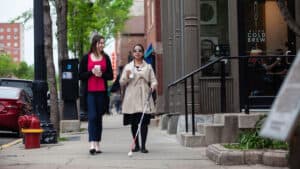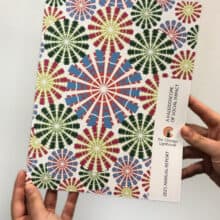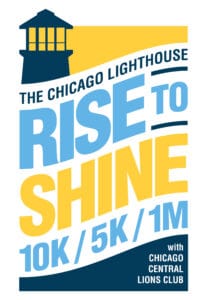Sandy’s Top Three Tips for Finding a Good Support System When You Have Low Vision
Learning you or a loved one has low vision can be mentally and emotionally overwhelming. Some questions and concerns running across your mind may include how will you be able to work, go to school, or simply do the things you love? While each experience and situation is unique, finding a support system that meets your needs is key. I have been blind most of my life. To say that having the support from my family, friends and community has been essential is an understatement. Over the years, I have found many resources and strategies to help in all aspects of my life. The following are some suggestions and tips for finding support from others.
1. Talk with others experiencing similar situations.
This can be done however you are comfortable. Joining a support group for people with vision loss, or occasionally emailing back and forth with others who have the same eye condition are just a few options. By doing this, you will be able to meet others who ‘get it’ and share similar experiences, challenges and successes. For me, this has helped tremendously with exchanging ideas and information with other people across the country and even the world. It has helped me learn about services and resources I otherwise might have never discovered. Asking local agencies that provide services to people who are blind or visually impaired or searching the web are easy ways to find support groups.
2. Do social activities with others who have vision loss.
When I was growing up, I always enjoyed meeting other children who were blind or visually impaired. Being the only student who was blind in many of my classes and even my entire school, I was not always able to interact with kids who had vision loss. It was usually during the summer that I would partake in camps and other programs for children who were blind or visually impaired. This no doubt was one of my favorite summer activities for two very important reasons. First, it was important for me to exchange stories about school and home life, things that worked and didn’t work, and even amusing situations we encountered as people with vision impairments. Especially as a teenager, having this peer-to-peer support helped me understand that I was not alone and that other youth my age were experiencing similar things. Second, meeting these individuals allowed me to make life-long friendships. In fact, I still keep in touch and spend time with some of the people I met as a child and teenager. Every once in a while, we will go out for lunch, watch a movie or simply hang out. It is reassuring to me knowing that this group of friends are always there if I need ideas or advice whether it be low vision-related or about other things.
3. Find ways to continue doing the things you love!
Something that I always emphasize to others is that living with low vision does not mean you have to give up your favorite leisure or other activities! I, for example, love traveling to new places and taking in the different cultures and cuisines. While I cannot partake in the sightseeing of attractions, I most certainly love being able to enjoy them by using my hearing, touch, smell and taste. I feel that in some ways, being blind allows me to enjoy travel even more than someone who has full sight. Nowadays, there are different resources and methods to adapt just about every activity imaginable. If you’re a bookworm, listening to audio books might be a good alternative. By using special techniques and adaptive tools, you can continue your passion of cooking if that’s what you enjoy doing. Physical activities, like swimming, running, cycling, baseball, rock climbing and skiing can also be modified for individuals with vision loss. No matter the activities, it is important to find or keep doing the things you used to enjoy prior to your vision loss. This will help you remain active, as well as included in your community.
Finding support from friends, family and your entire community is critical as someone who has low vision. I have been completely blind for over 30 years, and still appreciate having a strong support system in my life. Thanks to my friends and others with vision loss, I know I can always find someone to talk to and share my feelings, ideas and learn about different resources. Remaining active in the community and with my friends and family is also important. Not only does this give me something to do, but it helps me feel included with others.
If you would like to find out more about low vision or the available resources, visit us at chicagolighthouse.org/what-is-low-vision. Here you can find out more about The Lighthouse’s programs and services, our Tools for Living Store, and information about resources available in the community.





